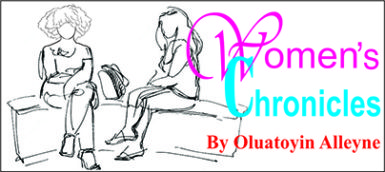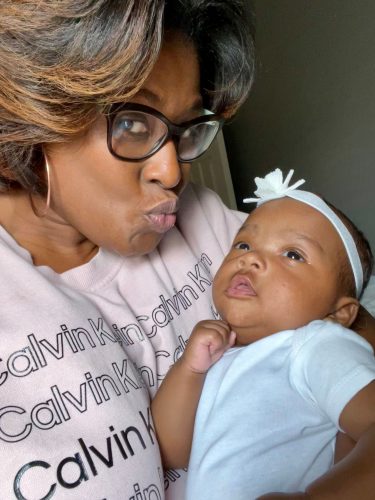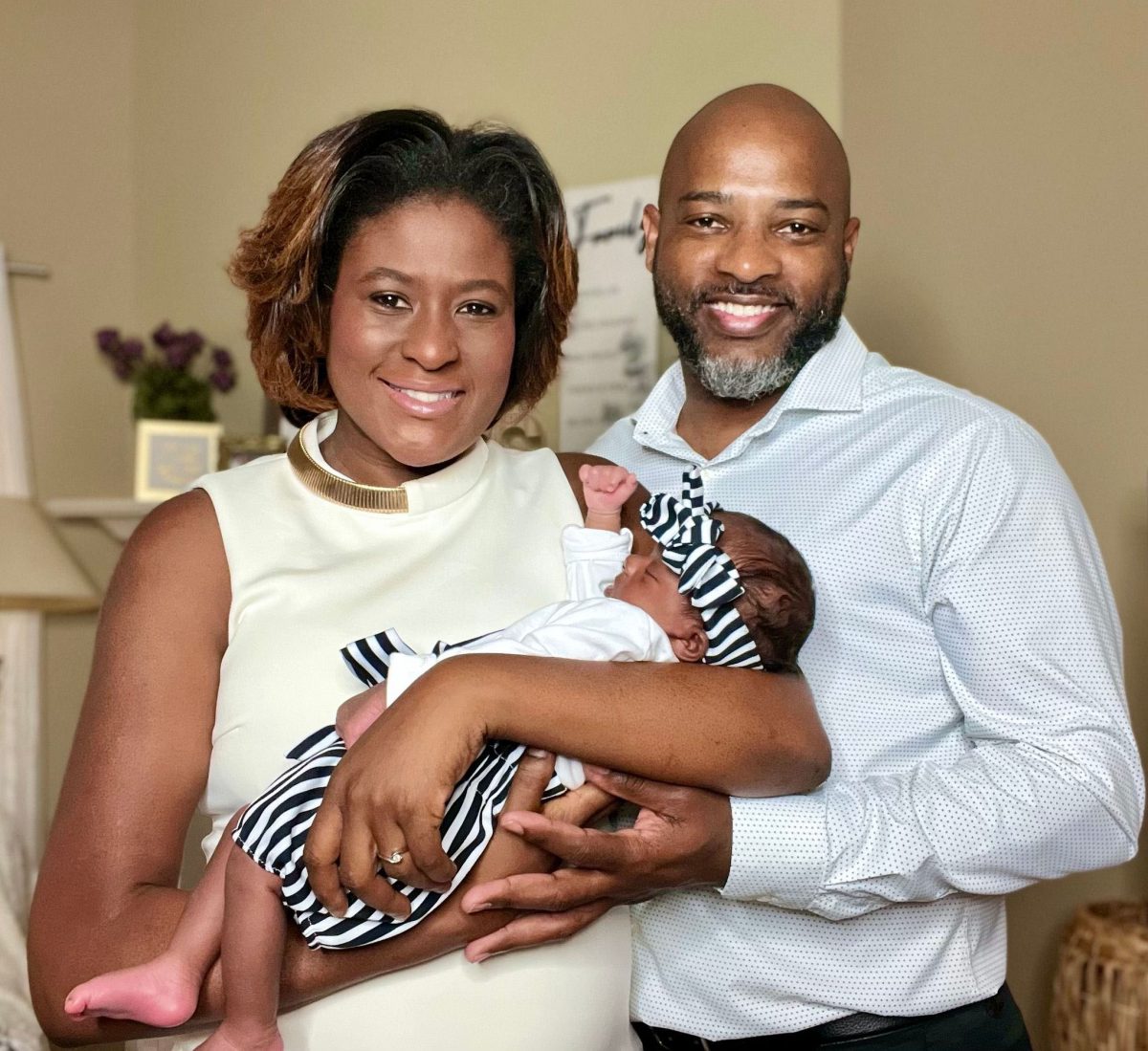 “My story starts with fibroids and I wouldn’t forget the gynaecologist who for almost ten years told me that I was infertile, and I would never be able to have a baby.”
“My story starts with fibroids and I wouldn’t forget the gynaecologist who for almost ten years told me that I was infertile, and I would never be able to have a baby.”
These are words of 43-year-old Samantha Gooden who recently became a mother. Samantha has been sharing her journey on Facebook and I reached out her. She agreed to speak to me from her home in the United States via the Zoom platform.
Her parents are Jamaican, but she was born in England and she has lived and worked in several countries, including Guyana, where she said she was adopted as a daughter of the soil. She has had many jobs, but today professionally describes herself as a marketing coach/consultant.

Samantha’s fibroid journey really exploded when she was 31; she had the first surgery at age 33 and it almost killed her. Around 34, she was told that she would not be able to have children.
“When I started going to the gynaecologist after the surgery I wouldn’t forget he sat me down in the office and said the best time for you to have had a baby was a year or two after your first surgery… And he just kept going on and on and he listed the five reasons why it’s not going to happen,” she told me.
Those reasons included her age, her eggs decreasing, prior surgeries before and scar tissue, and the possible blockage of her fallopian tubes because of adhesions. At that time she was not even trying. “I wouldn’t forget the day because I left his office and I just sat down in the car and I cried and cried and cried,” she said getting emotional as she recalled that day.
“And I think what was incredulous to me was that I could work so hard and prioritise many other things and this would not work for me. I was doing all kinds of exercise and I had a really healthy diet and I was doing the things I thought I was supposed to do just to be ready and your desire for something enhances when you are told you can no longer have it.
“I started to have this desire which eventually I pushed away because it was like torment desiring something that I was told I couldn’t have.
“These are not things that we talk about. I don’t know if it is because of the colonial past but there is this innate feeling that as black women we should be able to have children. It is like whenever you are ready to do it, it would be there for you. But I found that wasn’t my story.”
She gave a list of other issues she had apart from fibroids that affected her ability to become pregnant.
Tormented
“As Caribbean women we are tormented by this strange desire [for] romance that is given to us in story books and movies… Many women in the mid to late thirties, forties are very often not getting this fairytale. But with that package also comes the desire for us to have a family,” she noted.
“We start to feel as if we are handicapped, if we don’t have one or the other or all of the above.”
According to Gooden, one in six couples experience infertility and if you start thinking about just women alone it is exponentially higher.
“I gave up actually. I decided that the white picket fence life was probably not for me and that’s when I threw myself into work and I threw myself into my career. I continued travelling with the agency that I worked with and then I was headhunted into an international telecommunication company…,” she told me.
“During that time, I decided to throw myself into other things in life.
“When I was on my death’s bed for the first surgery, I had this kind of vision that if I was going to die one of the things I would have regretted was that I didn’t go to Australia. So, I planned a trip to Australia because that always felt that it was something I could never achieve or never do.”
Around that time as well she left the telecommunication company and started her own marketing company and continued to work hard.
“I started extending myself in a mother role to members of my team and to others in the community. A lot of that happened when I was in Guyana, where I brought people into my space where I could help to mentor.
“I started seeing myself more in that role and realizing that maybe the mother thing may never happen for me; not in the biological way,” she said.
The trip to Australia gave her a sense of peace as she accomplished something she had desired.
“But I also remembered the sense of pain because now what I truly desired or the thing that I thought was the most impossible thing I have done it and I don’t know what was next for me. I remember at the time I was in a ‘situation-ship’ and now a relationship… It became clear to me that in that relationship I would not get emotional fulfillment but I also realised I was holding myself back from real love.”
She left Australia and travelled to Bali, where she started to notice couples with babies.
“I remember I wrote to one of my best friends and I said, ‘do you think anyone could really love me?’ And the more that I asked myself that question I realised that I didn’t want to
be in a ‘situation-ship’. Somewhere in my mind I thought if my potential partner knew I couldn’t have a baby then I could not be loved, and I was broken.
“I just kept trying to push through but I ended the ‘situation-ship’ and it ended in an ugly way. I redirected energy…,” she said.
“Later in that year I was reintroduced to somebody who had been my friend for almost 20 years, and I didn’t even realise. As that relationship started to kind of blossom, I started thinking to myself that I have to share the news that I am not fertile.
“It was news that I kinda kept away for some time… I shared it and he didn’t make me feel like I was broken,” she said quietly.
She paused for a while before she continued speaking again: “I didn’t think that kind of love was going to happen to me and I really wanted to work on this relationship and in the back of my head I was thinking the clock is ticking but I took my foot off the gas pedal on that.”
The relationship continued and then COVID-19 came while they were in Barbados, where she was rebuilding a business which was doing well.
Fertility
“But at that time, I started to feel a lot of pain in my body and I went to a doctor and he said to me your fibroids are back… That was the exact state I was in ten years prior and I knew what that meant, surgery again and the likelihood of hysterectomy which he said was very high because of the complications in previous surgeries,” she said.
It was at that point she knew that if she really wanted to have a child, she had to explore the option of artificial insemination, even as she was given a schedule for possible surgery.
She checked out the Barbados fertility centre, “and it was the first time anyone had given me hope that there was a possibility”. Several minor surgeries later she was given the hope that a baby could grow inside her body.
“I knew there was no guarantee, but I was willing to try. My relationship — we were serious, but it was not like we were engaged or anything. But I shared that the moment was now, and I just asked if it was something he would be open to supporting me while I went through the process and he said yes.
“And I tell the story to women who ask that sometimes an opportunity is presented to you before think you are ready for it and in that moment, what is important is being able to weigh the long-term benefits for you. Outside of the relationship, outside of the opinions of others what is your true desire and make a decision for yourself.
“I remember the day like it was yesterday…it was my embryo transfer day… It was nerve wracking. I have been preparing my uterus and you just don’t know, and I went, and I did this, and you get in scrubs and everything and it is so fast…,” she said laughing.
“I never did a pregnancy test before and I was waiting. They said you have to wait x amount of time and I did and it was three o’clock in the morning and I got up and peed on the stick and it was oh my goodness positive, I just couldn’t not believe it,” she said.
She was 43. She laughed, but the tears were close, as she recalled that moment during our conversation.
She had not pulled back enough from her business at that point and she remembers being in a virtual meeting and starting to bleed.
“I started crying…started bawling because I knew that was not a good sign,” she said, close to tears again.
She paused again. There were many pauses during our almost one-hour conversation.
A week of agony after that scare an ultrasound revealed that the embryo was intact and that was when she pulled back from everything.
“I pressed brakes on everything in life except being able to be there for this being because I had waited over 40 years for this,” she continued.
“And while all of that happened, we got married,” she said, with a joyous laugh.
“I experienced love in a brand-new way because this was love in the midst of feeling that I was broken, and it was love in the midst of me not being perfect. It was love that was not fairy-tale, this was love truly accepting me for who I was.”
It was a difficult pregnancy.
“You can have your miracle on your doorstep, but it doesn’t mean that when you unwrap your precious gift you will not still have challenges,” she said philosophically, sharing that every week a new challenge popped up.
When the labour pains came she was not aware what they were. Eventually she was driven to the emergency room and by then she was already 4 centimetres dilated and she was rushed into surgery.
“I got there at 8 o’clock and the baby was born a little after ten. It was a little girl,” she shared. It did not end there as she was readmitted to hospital because of other complications.
“I really had it and I am really going through it but the baby makes it all worth it because for me this is a beautiful human that God has blessed me to be able to guide in this world through all of that,” the sister shared.
The baby girl is almost four months. Her name is Emma-Riley. She was born in the US, where her parents now live, and her mommy is involved in minimal online work even as she redesigns a work model for herself and women like her who have families or want to make a lifestyle change.






